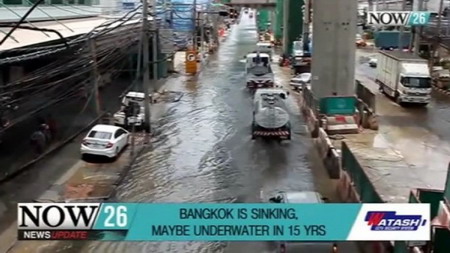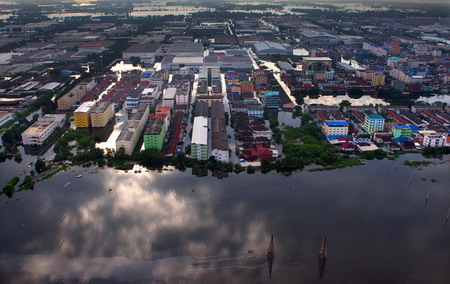 © Source : http://www.now26.tv/view/50884/BANGKOK-IS-SINKING-MAYBE-UNDERWATER-IN-15-YRS.html
© Source : http://www.now26.tv/view/50884/BANGKOK-IS-SINKING-MAYBE-UNDERWATER-IN-15-YRS.html
Bangkok has gradually shifted from a water-based city to a land-based one as roads replaced water transports and concrete houses replaced houses on stilts. The urbanisation of the thai capital occurred alongside some major environmental transformations : domestic and industrial pollution of canals and rivers, atmospheric pollution, the diking against flood, land subsidence due to overexploitation of groundwater and the increased waterproofing of the ground due to the concrete-oriented urbanisation of Bangkok. In a critical perspective of political ecology and historical geography, the thesis analyses the city of Bangkok as an integrated ecosystem within which circulates energies, resources, risks, waste, as well as discourses and power.
 © Source : https://www.theatlantic.com/photo/2011/10/bangkok-underwater/100178/#img02
© Source : https://www.theatlantic.com/photo/2011/10/bangkok-underwater/100178/#img02
Water as well as infrastructural networks constitute vectors and manifestations of these circulations. The environmental transformation of Bangkok isn’t only the result of an urbanisation process usually presented as uncontrolled and inevitable but it is also the result of political and financial interests that constantly reshape the flow and spatial distribution of costs and benefits associated to the transformation of the aquascape and hydrologic cycle. The thesis thus handles the institutional power play around water management. It analyses the evolution of public water policies, particularly after big events like the historical flood of 2011 and it recontextualises the environmental risks in a frame of political and economic stakes.
Keywords: Political Ecology, Sociology of organizations, floods, water governance, water policies, Bangkok






